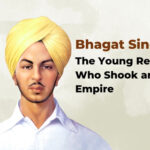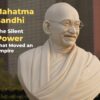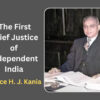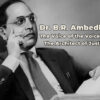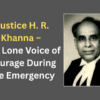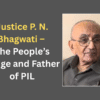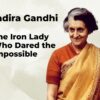In the pages of India’s freedom struggle, where non-violence was the dominant voice, there echoed another — fierce, defiant, and unyielding. It was the voice of Subhas Chandra Bose, the man who dared to say:
“Give me blood, and I will give you freedom!”
To millions, he was Netaji — a leader who didn’t ask India to wait, but to rise and fight. He didn’t believe in slow negotiations with the British — he believed in revolution. A soldier, a visionary, a patriot to the core — Netaji was the spark that refused to fade, even in the face of death.
A Brilliant Mind with a Burning Heart
Subhas Chandra Bose was born on 23rd January 1897 in Cuttack, Odisha. From a young age, he was intensely spiritual and deeply patriotic. He excelled in studies and was sent to England to prepare for the Indian Civil Services (ICS) — the highest government job under British rule.
He passed with flying colors. But then came the moment that defined him: he resigned from the ICS, saying,
“It is not possible for me to serve under a foreign government.”
He chose struggle over comfort, chains over salary, and freedom over fear. That one act made it clear: Bose was not born to obey — he was born to lead.
A Revolutionary Spirit Within the Congress
Subhas joined the Indian National Congress and quickly rose through the ranks due to his intelligence, discipline, and courage. But he was different from other leaders:
- He respected Gandhi, but believed that non-violence had its limits.
- He wanted instant and complete independence, not gradual freedom.
- He believed in industrialization, military strength, and youth power.
In 1938, he became the President of Congress, but his ideas clashed with conservative leaders. In 1939, he resigned — not in defeat, but in defiance — and formed the Forward Bloc.
He was not here to wait — he was here to win back India.
The INA: Army of Freedom
When World War II broke out, Bose saw an opportunity: “Britain is weak. This is our moment.”
He made the boldest decision any Indian leader had ever made — he left India in disguise, traveled through Germany and Japan, and began building an army of Indians abroad.
This became the legendary Indian National Army (INA) — made up of Indian prisoners of war and expatriates in Southeast Asia. His battle cry:
“Chalo Dilli!”
(“March to Delhi!”)
He declared the Provisional Government of Free India in 1943 and launched military campaigns in northeast India, hoisting the Indian flag in Andaman and Nicobar. Though militarily the INA didn’t succeed, it ignited a psychological revolution. For the first time, the British realized: Indian soldiers were ready to fight against them.
A Leader of Steel and Soul
What made Netaji unforgettable was not just his bravery — but his sacrifice.
- He faced multiple arrests, exiles, and hunger.
- He worked 20 hours a day, speaking to soldiers, planning strategy, inspiring millions.
- He could have chosen an easy life — but chose one of fire, exile, and risk.
To his troops, he wasn’t a distant general — he was a father, a comrade, a flame that warmed even the coldest night.
The Mysterious End
In August 1945, news broke: Netaji had died in a plane crash in Taiwan. But the fire he lit did not die.
His death remains surrounded by mystery, but his legacy remains immortal. His words became the anthem of a generation:
“It is blood alone that can avenge the blood that the enemy has spilled.”
The Impact That Shook the Empire
Even the British admitted that after the INA trials, Indian soldiers in the British Army began revolting. The Naval mutiny of 1946, inspired by Netaji’s courage, became a wake-up call for the empire.
Historians today agree: Netaji’s INA was one of the final nails in the coffin of British rule in India.
Conclusion
Subhas Chandra Bose did not live to see independence — but he helped shape it. His fire, his dream, his roar — still echoes in every Indian heart that refuses to accept injustice.
“Freedom is not given — it is taken.”
And take it, he did — not just for himself, but for every Indian who had ever been told they were less.
He remains the symbol of courage without compromise, of action without fear, and of love for the motherland that burns forever.



